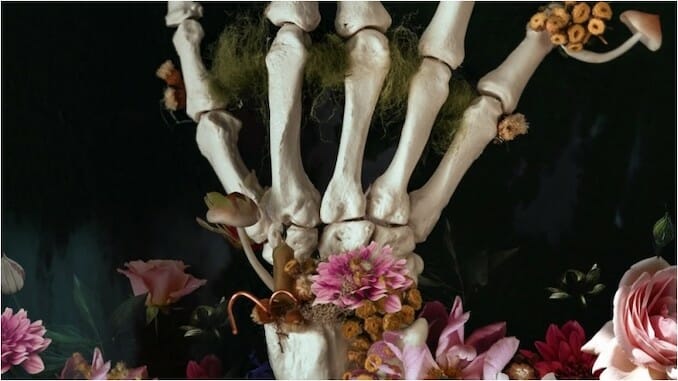The Bone Orchard: A Necromantic Political Fantasy That Could Use Some Pruning

Narratively The Bone Orchard, Sara A. Mueller’s debut novel, has great bones: Charm, a necromancer-turned-concubine, is called to the dying Emperor’s bedside to solve his murder. If she can figure out which of his sons (ranging from inept to insane) poisoned him, she’ll earn her freedom. It’s a Gothic fantasy whodunnit led by a charmingly layered woman who makes the unlikeliest of sleuths.
But there’s more. That freedom isn’t metaphorical; Charm is kept in her place by a mindlock, a contraption of crystal and mechanical gears that grinds the brains of Borenguard’s psychics into submission. The Emperor’s realm teems with those touched by a damning gift that more often drives its recipients to madness than improves their lives. And it’s not just Charm who exists in her own head, but also a persona known as the Lady, the true necromancer who occasionally surfaces to create new bodies in which to transplant all of her pesky emotions like Shame and Desire. The kicker? Charm, and the Emperor, and his sons, and various other key players are nigh immortal, thanks to life-extending Rejuv pills. All of these plot elements feel like almost too much flesh heaped upon these bones, threatening to obscure the cunning shape beneath.
Mueller confidently establishes necromancy as some ephemeral power existing somewhere between magic and science, balancing the psychic gift that allows Charm to absorb and expel emotions with the glass and steel of the growth tanks, filled with precious empathy fluid. Necromancy has had a resurrection (heh) within SFF lately thanks to novels like Tamsyn Muir’s Gideon the Ninth, but Borenguard stands on its own as a setting I would be eager to see more stories in.
The majority of the action, from sussing out potential assassins and collaborators among Borenguard’s most prominent politicians to Charm clashing with her boneghosts, takes place at the eponymous Orchard House. Forcing characters like the anonymous hive mind of mindlocked guards known as Firedrinkers, or the dashing and enigmatic (but underutilized) Major Nathair, to set foot on the grounds of this house of ill repute, with its bones singing like wind chimes in the garden, puts them squarely on Charm’s turf.
It’s also a keen parallel representing how this infamously burbling madam with her outrageously-dyed hair is actually a prisoner: stuck forever in her nineteen-year-old body, yet possessed of the experience and cynicism of a woman in her fifties, empress of her limited domain.
It’s also just a well-worldbuilt setting. In truth, I haven’t seen a fantasy brothel’s socioeconomic foothold within its city given this much consideration since the Court of Night-Blooming Flowers in Jacqueline Carey’s Kushiel’s Legacy series. Orchard House and its boneghosts conduct a very specific business on the second floor, to be sure, but its ground floor is host to weekly card games with political stakes and mouth-watering meals that tempt men away not from their wives, but from their cooks.
-

-

-

-

-

-

-

-

-

-

-

-

-

-

-

-

-

-

-

-

-

-

-

-

-

-

-

-

-

-

-

-

-

-

-

-

-

-

-

-








































